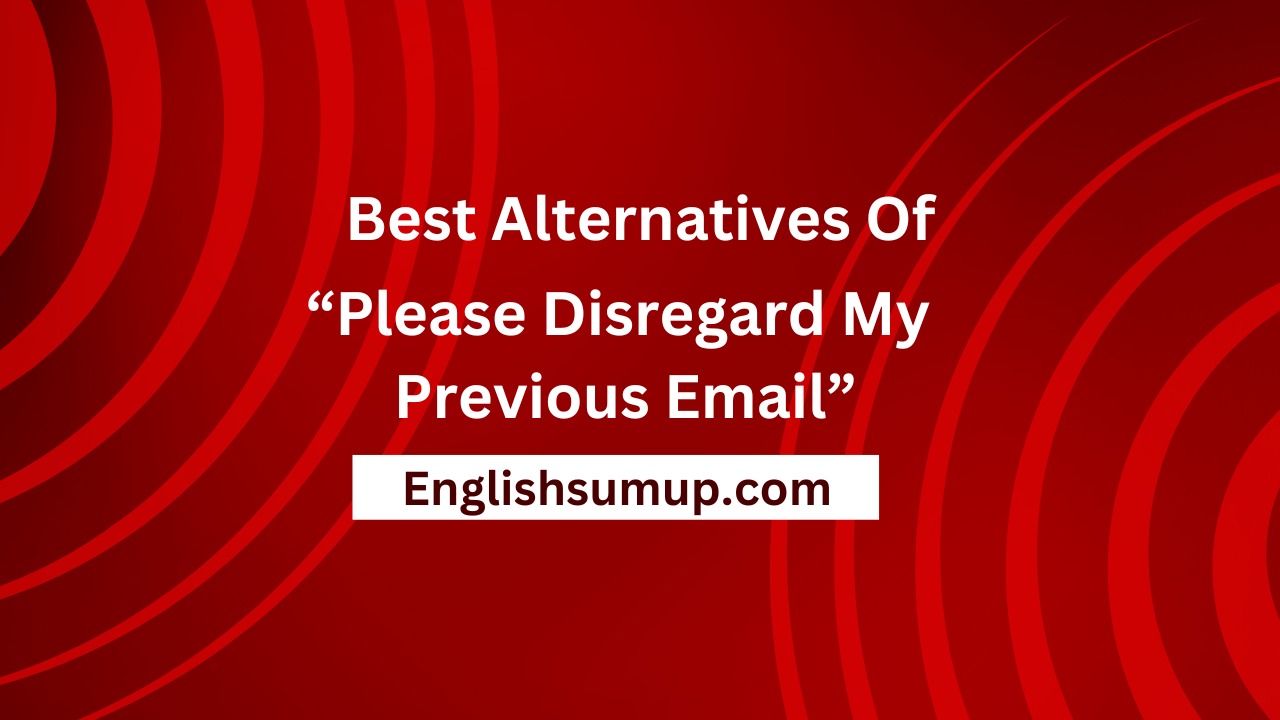Are you seeking a diplomatic way to communicate the need to overlook an email due to inaccuracies or outdated information?
Perhaps you are concerned that the straightforward phrase “please disregard my previous email” may lack finesse or appear less than professional.
- Is It Professional to Say “Please Disregard My Previous Email”?
- What to Say Instead of “Please Disregard My Previous Email”
- “Kindly overlook my previous correspondence.”
- “I request you to disregard my earlier email.”
- “The previous email I sent is no longer applicable.”
- “You are encouraged to pay no heed to my last message.”
- “I would appreciate it if you could disregard my prior email.”
- “Feel free to dismiss the email I sent earlier.”
- “Consider my earlier email as inconsequential.”
- “Please ignore any relevance of my previous email.”
- “I would like to retract the importance of my prior message.”
- “Disregarding my last email is advised.”
- “The information in my recent email is now obsolete.”
- Conclusion:
Fortunately, you’ve come to the right place.
This article has curated a collection of synonyms to guide you in expressing the request to disregard a previous email with tact and professionalism.
Is It Professional to Say “Please Disregard My Previous Email”?

Opting for the phrase “please disregard my previous email” is a professional and tactful approach, especially when acknowledging an inadvertent mistake or the presence of inaccurate or outdated information in the initial communication.
A practical example can be observed in the following email sample:
Sub: Clarification Regarding Previous Email
Dear John,
Please disregard my previous email, as it contains information that has since changed.
I will promptly update you once I gather more accurate details.
Thank you for your understanding.
Best regards,
Devon
To add a heightened level of formality, consider replacing “my” with “the” for a more impersonal tone. This adjustment proves effective when representing your company’s interests:
Sub: Clarification Regarding Previous Email
Dear John,
Please disregard the previous email, as it was not intended for your attention.
We will notify you promptly as soon as more relevant information becomes available.
Best wishes,
Devon
Pros:
Professional and sincere tone.
Effectively addresses and owns up to mistakes in the initial email.
Cons:
Can be perceived as repetitive.
Lacks explicit explanation for why the recipient should disregard the email.
While “please disregard my previous email” remains a valid and courteous choice, it’s important not to limit oneself to this singular option. This article delves into alternative phrases that offer nuanced approaches based on varying contexts. Exploring these alternatives will provide you with a versatile toolkit to communicate effectively when requesting the disregarding of an email.
What to Say Instead of “Please Disregard My Previous Email”
- “Kindly overlook my previous correspondence.”
- “I request you to disregard my earlier email.”
- “The previous email I sent is no longer applicable.”
- “You are encouraged to pay no heed to my last message.”
- “I would appreciate it if you could disregard my prior email.”
- “Feel free to dismiss the email I sent earlier.”
- “Consider my earlier email as inconsequential.”
- “Please ignore any relevance of my previous email.”
- “I would like to retract the importance of my prior message.”
- “Disregarding my last email is advised.”
- “The information in my recent email is now obsolete.”
“Kindly overlook my previous correspondence.”
This phrase combines a polite request with the notion of overlooking, indicating a desire for the recipient to dismiss the content of the prior communication. Isn’t this better than “Please Disregard My Previous Email”.
Sub: Request for Disregard of Previous Email
Dear John,
I trust this message finds you well. Kindly overlook my previous correspondence as there have been updates to the information. Your understanding is greatly appreciated.
Best regards,
Devon
“I request you to disregard my earlier email.”
This direct request conveys a clear intention for the recipient to ignore the content of the earlier email. It adds a formal touch to the communication. Isn’t this better than “Please Disregard My Previous Email”.
Sub: Formal Request for Disregard
Dear John,
I hope this email reaches you in good health. I request you to disregard my earlier email as there have been revisions to the information provided.
Sincerely,
Devon
“The previous email I sent is no longer applicable.”
This phrase straightforwardly communicates that the content of the prior email is no longer relevant or valid, ensuring clarity in the recipient’s understanding. Isn’t this better than “Please Disregard My Previous Email”.
Sub: Important Update: Prior Email No Longer Applicable
Dear John,
I trust this message finds you well. I wanted to inform you that the previous email I sent is no longer applicable. Please consider this as the latest update.
Best wishes,
Devon
“You are encouraged to pay no heed to my last message.”
This expression encourages the recipient to disregard the last message, adding a supportive tone to the request while emphasizing the lack of significance. Isn’t this better than “Please Disregard My Previous Email”.
Sub: Encouragement to Disregard Previous Message
Dear John,
I hope this email finds you in good spirits. You are encouraged to pay no heed to my last message, as there have been changes to the information provided.
Regards,
Devon
“I would appreciate it if you could disregard my prior email.”
This polite request emphasizes appreciation while kindly asking the recipient to ignore the content of the previous email. It maintains a courteous tone. Isn’t this better than “Please Disregard My Previous Email”.
Sub: Request for Disregard with Appreciation
Dear John,
I would appreciate it if you could disregard my prior email, as there have been updates to the information. Your understanding is valued.
Best regards,
Devon
“Feel free to dismiss the email I sent earlier.”
This phrase adopts a casual yet polite tone, inviting the recipient to freely dismiss the content of the earlier email. It promotes an open and understanding atmosphere. Isn’t this better than “Please Disregard My Previous Email”.
Sub: Casual Request for Dismissal
Dear John,
I hope this email finds you well. Feel free to dismiss the email I sent earlier, as there have been changes to the information provided.
Best wishes,
Devon
“Consider my earlier email as inconsequential.”
This expression suggests that the previous email holds no consequence or importance, encouraging the recipient to treat it as insignificant. Isn’t this better than “Please Disregard My Previous Email”.
Sub: Treating My Earlier Email as Inconsequential
Dear John,
I trust this email finds you well. Consider my earlier email as inconsequential, as there have been revisions to the information.
Regards,
Devon
“Please ignore any relevance of my previous email.”
This phrase politely requests the recipient to ignore the relevance of the previous email, acknowledging the changing circumstances. Isn’t this better than “Please Disregard My Previous Email”.
Sub: Request to Ignore Relevance of Previous Email
Dear John,
I hope this email reaches you in good health. Please ignore any relevance of my previous email, as there have been updates to the information provided.
Sincerely,
Devon
“I would like to retract the importance of my prior message.”
This formal expression conveys a desire to retract the significance of the prior message, emphasizing a change in perspective regarding its importance. Isn’t this better than “Please Disregard My Previous Email”.
Sub: Formal Retraction of Prior Message’s Importance
Dear John,
I trust this message finds you well. I would like to retract the importance of my prior message, as there have been changes to the information provided.
Best regards,
Devon
“Disregarding my last email is advised.”
This phrase suggests that it is advisable for the recipient to disregard the content of the last email, offering a straightforward recommendation. Isn’t this better than “Please Disregard My Previous Email”.
Sub: Advisory to Disregard Last Email
Dear John,
I hope this email finds you in good health. Disregarding my last email is advised, as there have been revisions to the information provided.
Regards,
Devon
“The information in my recent email is now obsolete.”
This straightforward expression communicates that the information in the recent email is no longer applicable or relevant, ensuring clarity for the recipient. Isn’t this better than “Please Disregard My Previous Email”.
Sub: Important Update: Recent Email Information Obsolete
Dear John,
I trust this email finds you well. The information in my recent email is now obsolete. Please consider this as the latest update.
Best wishes,
Devon
Conclusion:
In conclusion, when seeking a refined and courteous way to rectify an error or update outdated information conveyed in a prior email, a versatile arsenal of expressions becomes essential. While the conventional phrase “Please Disregard My Previous Email” remains a reliable and polite choice, the alternatives explored in this comprehensive guide open avenues for nuanced communication tailored to diverse professional contexts.
“Please Disregard My Previous Email” serves as a polite beacon, guiding recipients to dismiss outdated or inaccurate information without causing unnecessary disruption. However, recognizing the potential for repetitiveness, the alternatives presented here offer a spectrum of choices, ensuring that your communication style aligns seamlessly with the formality and context of each situation.
In navigating the intricacies of professional correspondence, employing phrases such as “Kindly overlook my previous correspondence” or “The information in my recent email is now obsolete” grants communicators the flexibility to articulate their message with finesse. These alternatives not only add variety to your language but also provide a tailored approach based on the intricacies of each scenario.
Therefore, the key takeaway is the importance of adapting your language to the specific needs of the moment. Whether it’s a formal request like “I would appreciate it if you could disregard my prior email” or a more casual tone with “Feel free to dismiss the email I sent earlier,” the ability to choose from a rich repertoire ensures your message resonates effectively.
In essence, while “Please Disregard My Previous Email” remains a courteous go-to, the diverse alternatives presented here empower you to navigate professional communication adeptly. By incorporating these varied expressions, you not only enhance the clarity and sophistication of your communication but also demonstrate a keen awareness of the recipient’s perspective and the evolving dynamics of the conversation.
So, as you continue to refine your professional communication skills, consider the nuances each alternative brings, allowing you to tailor your requests with precision. Embrace this array of choices, and remember, the art of communication lies not just in what you say but in how thoughtfully and considerately you express it. Please disregard any hesitation and confidently select the phrase that best suits your unique situation, ensuring a seamless and polished communication experience.

